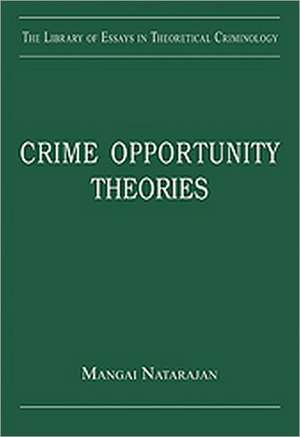Crime Opportunity Theories: Routine Activity, Rational Choice and their Variants: The Library of Essays in Theoretical Criminology
Editat de Mangai Natarajanen Limba Engleză Hardback – 23 noi 2011
Preț: 1978.23 lei
Preț vechi: 2808.51 lei
-30% Nou
Puncte Express: 2967
Preț estimativ în valută:
378.65€ • 411.44$ • 318.27£
378.65€ • 411.44$ • 318.27£
Comandă specială
Livrare economică 31 martie-14 aprilie
Doresc să fiu notificat când acest titlu va fi disponibil:
Se trimite...
Preluare comenzi: 021 569.72.76
Specificații
ISBN-13: 9780754629702
ISBN-10: 0754629708
Pagini: 616
Dimensiuni: 174 x 246 mm
Greutate: 1.41 kg
Ediția:1
Editura: Taylor & Francis
Colecția Routledge
Seria The Library of Essays in Theoretical Criminology
Locul publicării:Oxford, United Kingdom
ISBN-10: 0754629708
Pagini: 616
Dimensiuni: 174 x 246 mm
Greutate: 1.41 kg
Ediția:1
Editura: Taylor & Francis
Colecția Routledge
Seria The Library of Essays in Theoretical Criminology
Locul publicării:Oxford, United Kingdom
Notă biografică
Mangai Natarajan is Professor in the Department of Criminal Justice, John Jay College of Criminal Justice of the City University of New York, USA
Cuprins
Acknowledgements, Series Preface, Introduction, PART I. THEORIZING SITUATIONAL DETERMINANTS OF CRIME, 1. 'Delinquency, Environment and Intervention', Journal of Child Psychology and Psychiatry, 26, pp. 505-23, 2. 'The Situational Analysis of Crime and Deviance', Annual Review of Sociology, 19, pp. 113-37, 3. 'Routine Activities and Individual Deviant Behavior', American Sociological Review, 4, pp. 635-55, PART II. THE PRODUCTION OF CRIMINAL OPPORTUNITIES: ROUTINE ACTIVITY THEORY, 4. 'Human Ecology and Crime: A Routine Activity Approach', Human Ecology, 8, pp. 389-406, 5. 'Routine Activities and Crime Prevention in the Developing Metropolis', Criminology, 25, pp. 911-31, 6. 'Routine Activities and Involvement in Violence as Actor, Witness, or Target', Violence and Victims, 12, pp. 209-21, 7. 'The Demand and Supply of Criminal Opportunities', in M. Tonry and N. Morris (eds), Crime and Justice, 7, Chicago: University of Chicago Press, pp. 1-27, PART III. DECIDING TO COMMIT CRIME: THE RATIONAL CHOICE PERSPECTIVE, 8. 'Modeling Offenders' Decisions: A Framework for Research and Policy', in M. Tonry and N. Morris (eds), Crime and Justice, 6, Chicago: University of Chicago Press, pp. 147-85, 9. 'Understanding Crime Displacement: An Application of Rational Choice Theory', Criminology, 25, pp. 933-47, 10. 'A Descriptive Model of the Hunting Process of Serial Sex Offenders: A Rational Choice Perspective', Journal ofF amily Violence, 22, pp. 449-63, 11. 'Serendipity in Robbery Target Selection', The British Journal a/Criminology, 50, pp. 514-29, 12. 'Organized Fraud and Organizing Frauds: Unpacking Research on Networks and Organization', Criminology and Criminal Justice, 8, pp. 389--419, 13. 'Parameters for Software Piracy Research', The Information Society, 24, pp. 199-218, PART IV. 'BOUNDED' RATIONAL CHOICE: GOOD ENOUGH OR NOT ENOUGH, 14. 'Rational Choice, Deterrence, and Social Learning Theory in Criminology: The Path Not Taken', Journal a/Criminal Law and Criminology, 81, pp. 653-76, 15. 'Situational Crime Prevention and Its Discontents: Rational Choice Theory versus the Culture of Now', Social Policy and Administration, 41, pp. 232-50, 16. 'Situational Crime Prevention and Its Discontents: Rational Choice and Hann Reduction versus Cultural Criminology', Social Policy and Administration, 44, pp. 40--66, 17. 'Karl Popper: A Philosopher for Ronald Clarke's Situational Crime Prevention?', Israeli Studies in Criminology, 8, pp. 39-56, PART V. VARIANTS BEYOND RATIONAL CHOICE AND ROUTINE ACTIVITY, 18. 'Activity Fields and the Dynamics of Crime: Advancing Knowledge about the Role of the Environment in Crime Causation', Journal of Quantitative Criminology, 25, pp. 55-87, 19. 'A Classification of Techniques for Controlling Situational Precipitators of Crime', Security Journal, 14, pp. 63-82, 20. 'Going Equipped: Criminology, Situational Crime Prevention and the Resourceful Offender', British Journal of Criminology, 40, pp. 376-98, PART VI. IMPLICATIONS FOR CRIME PREVENTION, 21. 'Situational Crime Prevention: Theory and Practice', British Journal of Criminology, 20, pp. 136--47, 22. 'Routine Activities and Crime Prevention: Armchair Concepts and Practical Action', Studies on Crime and Crime Prevention, 1, pp. 30-34, 23. 'Minimising Corruption: Applying Lessons from the Crime Prevention Literature', Crime, Law & Social Change, 30, pp. 67-87, 24. 'Subway Slugs: Tracking Displacement on the London Underground', British Journal of Criminology, 34, pp. 122-38, 25. 'Assessing the Extent of Crime Displacement and Diffusion of Benefits: A Review of Situational Crime Prevention Evaluations', Criminology, 47, pp. 1331-68, Name Index
Descriere
Opportunity theories of crime emphasize the fundamental element in the criminal act of opportunity: how this arises, how it is perceived, evaluated and acted on by those with criminal dispositions. This volume brings together influential research articles on opportunity theories of crime by leading theorists; the articles also include more recent theoretical developments and studies of situational crime prevention of specific twenty-first century crimes.











